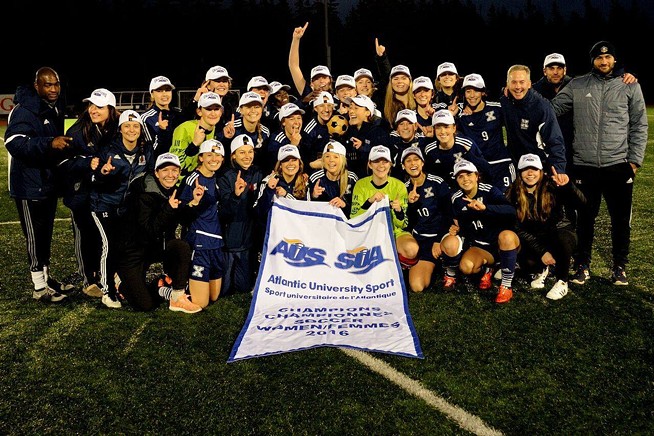Canada’s greatest soccer player of all time has a message for the sport: Women’s pro soccer belongs in this country—and it’s coming soon.
On Monday night, FIFA’s all-time leading goal scorer, Christine Sinclair, joined her former national teammate Diana Matheson on CBC’s The National to announce they’ve been working on a first-of-its-kind domestic women’s professional soccer league, which is set to begin in 2025.
It’s a plan that’s been more than a decade in the making—and one soccer supporters in Halifax are watching closely.
Eight teams will compete in league’s first season
The two Canadian internationals are targeting eight inaugural teams for the as-yet-unnamed league. Matheson told TSN that Project 8 Sports Inc.—which she co-founded and will serve as the backing business for the league—is looking into 13 potential markets across Canada as homes for soccer clubs. The plan is for the league’s eight teams to be divided into two conferences, with four in the west and four in the east.
“The whole idea behind this is to aim high,” Sinclair told CBC. “And like, if you're not, what's the point?”
🧵Why are we doing this? Why Now?
— Project 8 (@Project8Sports) December 6, 2022
Because Canada has the 3rd highest player pool in the world for girls and women.
Because 1/3 of girls drop out of sport in comparison to 1/10 of boys.
Both Vancouver Whitecaps FC and Calgary’s Foothills Soccer Club have signed on as founding members—something former Canada ‘keeper Stephanie Labbé, now the Whitecaps’ general manager of women’s soccer, feels has been a long time coming.
“The creation of this league is something we have been advocating for over many years,” she said in a statement, “and to be part of seeing it come to fruition is truly exciting.”
Which begs the question: Is there room for a team in Halifax?
‘We’re seeing lots of talent in Nova Scotia’
Retired soccer player-turned-player agent Alix Bruch is gung-ho on the sport’s potential in Nova Scotia’s capital. Now based in Halifax, the Calgary-raised Bruch led the St. Francis Xavier University X-Women to an Atlantic University Sport championship as a star midfielder in 2016—then made the leap to competing in Europe’s top-flight Women’s Champions League the following year.

At the time, there was no path to a professional career in Canada—something that “would have meant everything,” she says, speaking by phone with The Coast. “For a long time, we had nothing really to aspire to in Canada… And so having this opportunity for players across the country is huge, because not every player wants to go overseas.”
As a women’s-dedicated soccer agent (she started Shift Athlete Services in 2021), Bruch is keenly attuned to the country’s burgeoning talent. The Maritimes are full of it, she adds: This year, Cape Breton University’s Capers finished fourth in the country with a roster that was nearly three quarters full of Atlantic Canadians. And 14 of the team’s 23 players hailed from Nova Scotia.
“I think that’s a real testament to the talent that we have here,” Bruch says. “Growing up in Calgary, we had the resources and the population to develop at a faster rate. But I think [now] we’re seeing years of work being put in… we're seeing lots of talent in Nova Scotia, and I think we’re going to get to a point where these players will be looked at for the national team.”
Cindy Tye, head coach of Dalhousie’s women’s soccer team and a member of Canada’s national team from 2001 to 2002, says she’s seen a “dramatic” increase in the number of women involved in the sport. “When I played there wasn’t as much opportunity for female players at any level. I played in boys’ or co-ed leagues until I was 13.”
Bruch points to the HFX Wanderers professional men’s team and its success with fans as evidence that a women’s soccer team could attract support in Halifax. The supporters she’s spoken with want a women’s team—“and they would show up for it,” she adds. “It’s just a matter of, are there people here willing to put in the money?”
Wanderers and Soccer Nova Scotia have expressed support
Any eventual Halifax entrant into the league would need an owner. HFX Wanderers FC founder and CEO Derek Martin has voiced his support for a pro women’s soccer team in Halifax before—but as of yet, any support has remained in word only. As early as October 2019, he told those gathered at a postseason Q&A that he’d “love” to see a Wanderers women’s team and that early discussions to make it happen were taking place. Martin doubled down on those comments in May as he made the push for an permanent, expanded stadium at Wanderers Grounds, telling Global News that a women’s team “would be a great fit with a new venue.”

Brad Lawlor, former executive director of Soccer Nova Scotia, added his voice to the chorus in May, telling CTV News that a revamped stadium “would help” in any discussions about bringing a women’s pro soccer team to Halifax.
A club wouldn’t come cheap. Matheson says buy-in for a team could run between $8-10 million. That’s triple the $3 million franchise fee the initial seven Canadian Premier League teams—including the Wanderers—paid in 2019, according to Reuters. But Matheson points to the National Women’s Soccer League in the US, where in the span of two years, club values have soared from $2-3 million to as much as $100 million, in the case of Los Angeles-based and A-list endorsed Angel City FC.
Countdown begins to 2025
When the first ball is kicked in three years, Matheson and Sinclair (who has signed on as a board advisor) will hope for their league to debut on the back of another Olympic gold medal-winning performance from Canada’s women’s national team in 2024. If they’re luckier, they’ll be riding an even bigger wave after a podium finish at the upcoming 2023 FIFA Women’s World Cup.
Matheson is thinking of the generation who’ll be watching those games and where they’ll have opportunities to play.
“I believe kids need to see it to believe that it's possible to happen,” she told CBC. “And with the launch of this league, kids will be able to go into their own backyard and watch their heroes play and dream of one day representing their hometown professional club and maybe representing Canada."
Setting a launch of 2025, Matheson told TSN, is “far enough away to give us time to build the plan,” and for each founding team to have 16 to 18 months lead-up ahead of the first kickoff. “We've only got one shot to build our first women's professional soccer league, so we have to do really well.”

